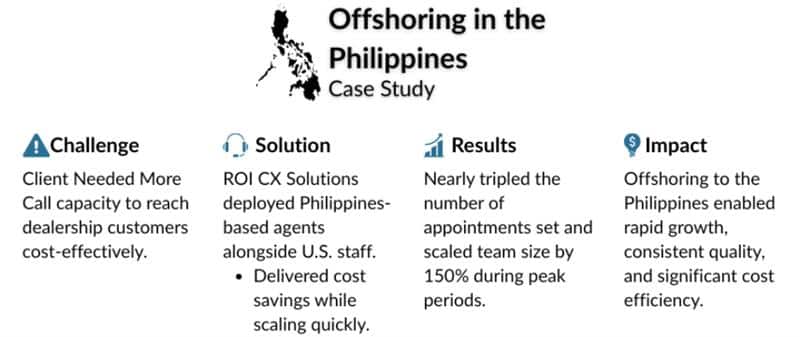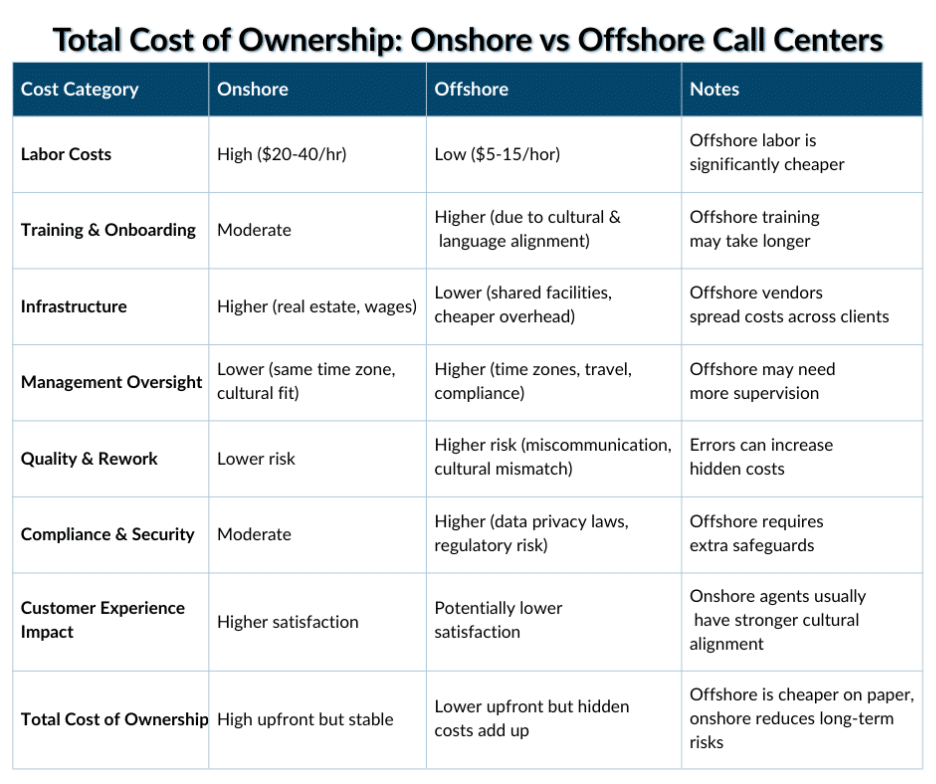When to Consider Onshoring Over Offshoring Your Contact Center
You should consider onshoring over offshoring your call center when customer experience, compliance, and brand reputation are top priorities. While offshore outsourcing can save money and scale quickly, it may introduce risks like data security challenges, cultural gaps, and reduced oversight. Onshoring delivers stronger alignment with customers, higher-quality interactions, and better regulatory compliance—making it the better fit for industries where trust and loyalty are critical.
Table of Contents
- Onshoring vs. Offshoring in Today's Business Climate
- The Benefits of Offshoring – Why It's Popular
- The Challenges of Offshoring
- Considering Onshore Or Offshore Contact Centers?
- When Onshoring Becomes the Better Choice
- Balancing Costs with Quality
- Hybrid Models – Finding the Right Fit
- Conclusion – Making the Right Decision for Your Business
Offshoring saves money and scales quickly, but it often creates hidden costs through poor customer experience, compliance risks, and operational challenges. Onshoring costs more upfront but delivers stronger oversight, better customer loyalty, and long-term value which might make it the better choice in regulated, high-touch, or reputation-driven industries.
Onshoring vs. Offshoring in Today's Business Climate
Contact centers have evolved to be so much more beneficial outside of the realm of just cutting costs, they are brand ambassadors. The decision of whether to pursue onshore call center outsourcing or offshore call center outsourcing is one of the most critical choices organizations face in shaping their contact center strategy.
It's a balancing act: cost savings vs customer experience in call centers. Offshoring has long been the go-to solution for companies looking to reduce expenses, but onshoring is increasingly being recognized as a strategic investment in brand reputation and customer satisfaction.
This article explores the nuances of onshoring vs offshoring contact centers, including the scenarios where one might be a better fit than the other. We'll also take a look at how hybrid models are evolving to provide businesses with the best of both worlds.

The Benefits of Offshoring – Why It's Popular
For decades, businesses have relied on offshore call center outsourcing to reduce costs and help expand operations. While customer preferences have shifted the conversation, there is no denying that offshoring remains an attractive option for many scenarios.
Cost Savings and Scalability
One of the main reasons companies use offshore call center services is cost efficiency. Labors costs in regions like the Philippines, South Africa, and Tunisia are substantially lower than in North America or Europe. Which means Businesses can operate larger teams at a fraction of the price.
Beyond savings, offshoring also enables scalability. Companies can quickly expand their teams during peak seasons without the constraints of local hiring. For industries with fluctuating call volumes, this flexibility becomes invaluable.

Access to a Global Workforce
Offshore outsourcing benefits companies by providing access to a diverse, global workforce. 24/7 customer support is no longer optional and offshore teams can provide round the clock coverage. This helps your customers always be able to get in contact with a team member whenever they call.
Lastly, a variety of offshore centers have multilingual support, which is great for global companies. Offshore teams provide a wide array of language capabilities which helps your customers get the personalized support they deserve.

The Challenges of Offshoring
While offshoring is often synonymous with cost savings, there are clear scenarios where onshore call center outsourcing offers greater value. Sometimes it can create customer experience challenges such as language barriers or frustrations with service quality. It might also bring up concerns about data security for organizations operating highly regulated industries. Managing operations from thousands of miles away can also make it difficult to maintain quality.
Customer Experience Concerns
While offshore agents are skilled and trained, sometimes customer satisfaction can be negatively impacted by cultural differences. Customers seeking highly personalized support can make these barriers even more frustrating and impersonal.
Often FCR and the CSAT can be lower in offshore environments compared to onshore or nearshore centers. Offshore agents can lack context and language barriers make effective communication more difficult. In industries where relationships are central to success, this drop in customer experience can impact customer loyalty.
Data Security & Compliance
For industries like healthcare, finance, or government, compliance and security in contact centers are non-negotiable. When handling sensitive data, offshore centers may face more scrutiny.
Consider healthcare providers managing patient data under HIPAA or companies in the finance industry processing credit card payments under PCI DSS. While offshore centers comply with international standards, regulatory enforcement can become a challenge when operations span multiple jurisdictions.
The risk of fines, lawsuits, and reputational damage can outweigh the cost savings for many companies.
Operational Oversight
Distance also creates challenges for operational oversight. Different time zones may cause delays in decision-making and slow down the flow of information. Maintaining real-time visibility makes it challenging to enforce consistent standards.
Common Oversight challenges include:
- Time zone delays in communication
- Difficulty with training and coaching
- Reduced visibility into operations
These challenges are why many businesses eventually look closer at onshore call center outsourcing.
When Onshoring Becomes the Better Choice
While offshoring remains an effective strategy for many, there are a few scenarios where onshore call center outsourcing provides clear advantages. Onshore teams are often able to provide higher levels of personalization and cultural alignment. It is also a great option for companies operating in industries with strict requirements. As Working Solutions points out, many businesses are turning to onshore call center outsourcing to improve customer satisfaction, strengthen brand alignment, and ensure compliance with industry regulations. One of the most compelling reasons companies choose onshoring is the ability to deliver high-touch customer interactions that require empathy.
High-Touch Customer Interactions
Not all customer service interactions are equal, and the value of high-touch support cannot be overstated. Customers in these scenarios expect empathy as well as expertise.
Some examples of these scenarios include:
- Technical support
- Financial consultations requiring trust and accuracy
- Customer service where the experience is part of the product
Onshore agents can often provide these nuanced experiences more effectively because they share cultural and linguistic backgrounds with the customer. This alignment can help companies better anticipate customer needs and provide the level of care that fosters loyalty.
Industry Regulations and Security Needs
For healthcare, finance, insurance, and government agencies, compliance and security in contact centers cannot be compromised. As mentioned before, regulations such as HIPAA and PCI DSS leave no room for error.
Onshore call centers provide closer oversight which helps reduce the risk of compliance breaches. A single mistake can have major impacts on revenue and reputation, and the added layer of security makes onshoring the clear choice.
Brand Reputation and Customer Loyalty
Customer service is an extension of your brand and every interaction with a customer impacts your reputation. Customers expect high value support no matter who they are interacting with.
Onshore call center teams bring a deeper understanding of local markets and customer expectations. This understanding fosters long-term loyalty and makes stronger connections with their audience. This alignment is often worth more than the cost savings of offshoring.
Shorter Feedback Loops & Operational Control
Beyond customer-facing benefits, onshore outsourcing provides some operational advantages as well. Domestic teams are easier to collaborate with; it helps when they are just an hour or two ahead or behind rather than twelve hours. Training, rolling out new initiatives, and adapting to changing customer expectations is easier with onshore teams. Fewer communication barriers create shorter feedback loops and help managers identify and fix issues quickly.
With more visibility, it is easier to provide consistent, quality service while still being able to scale efficiently. Onshore call centers are great for companies that want to balance customer satisfaction with operational agility.
Balancing Costs with Quality
Often the debate between offshore and onshore comes down to cost but contact center ROI isn't as simple as just hourly wages. Businesses must consider the Total Cost of Ownership (TCO), including the hidden costs that get rid of savings over time.
Below is a chart breaking everything down.

The numbers may suggest offshore call centers are the most cost-effective option. Upfront labor and infrastructure savings can be attractive, but they often mask expenses that don't appear on the initial balance sheet.
Some hidden costs of offshoring can include:
- High agent turnover and retraining expenses: Offshore centers often see higher employee turnover, which results in more money spent on recruiting and training new agents. Onshore partners typically provide better working conditions and stability.
- Lower customer satisfaction: Cultural gaps, language barriers, or lack of context can lead to frustrating interactions, driving customers away. Onshore outsourcing delivers smoother communication and a more familiar customer experience.
- Unresolved calls: Poorly handled interactions disappoint customers and miss chances for upselling and building loyalty. Onshore agents have better training and are equipped to resolve issues effectively.
- Compliance risks and fines: Offshore operations may struggle with strict U.S. regulations around data security and privacy. Onshore outsourcing offers stronger oversight to help maintain standards and avoid costly penalties.
By contrast, onshore centers may cost more upfront but deliver a better experience and fewer compliance risks. Onshoring can be more cost-effective in the long term.
Hybrid Models – Finding the Right Fit
It may be that the most effective contact center strategy is not purely onshore or offshore, but a bit of both. This approach gives companies the strength of domestic and international operations.
Hybrid contact center models help organizations allocate resources based on the nature of customer interactions. Routine tasks can go offshore, and more complex tasks can be dealt with by the onshore team. This provides a more personalized customer experience while cutting costs.
Another benefit of hybrid models is that they also provide strategic agility by helping companies scale based on their needs. Adjusting the number of agents up or down takes a process that was once expensive and time consuming and makes it effortless. Retaining high-touch interactions domestically will also reinforce brand trust while removing risks that come from impersonal service.
When done right, hybrid contact centers cut down on costs and improve customer satisfaction. Leadership can focus on strategies for growth, and every interaction reflects the organizations commitment to excellence.
Conclusion – Making the Right Decision for Your Business
The choice between onshore vs offshore contact centers is an important, strategic decision. Offshoring offers cost savings and scalability, but onshoring provides better customer experience, compliance standards, and brand loyalty.

Some companies might find that offshoring works better for them, and others might find onshoring provides more value. Many will find success using the hybrid model.
At ROI CX Solutions, we provide customized contact center strategies that align with your goals. Partner with us to design a solution that balances cost with customer satisfaction and gets measurable ROI and unforgettable customer experiences.






